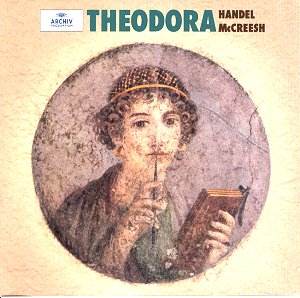HANDEL
Theodora
 Cast
Cast
Theodora ... Susan Gritton
Irene ... Susan Bickley
Didymus ... Robin Blaze
Septimius ... Paul Agnew
Valens ... Neal Davies
Messenger ... Angus Smith
Gabrieli Consort and Players Paul
McCreesh
 Archiv 469 061-2 3CDs.
(DDD)
Archiv 469 061-2 3CDs.
(DDD)
Crotchet

This is a handsome production.
There is so much to praise one hardly knows where to begin.
The recorded sound is very good and devoid of echoes, reverberations and
all such other things that can plague a recording. The soloists are excellent
and certain arias are , quite frankly,
breathtaking or sheer beauty. The chorus is superb and some choruses are
so very well executed that you have to play them again to makes sure you
are not dreaming. The conducting seems absolutely right and the playing of
the Gabreli Consort is a delight.
The usual horrors of performances of such masterworks as this are all absent.
Although authentic instruments are used there is no affectation which ruins
the performances of early music such as the infuriating lingering for ages
over a perfect cadence or the bass continuo being so heavy that it distracts
from all else that is going on. The tempi are expertly judged and we do not
hang around to squeeze something out of the music that is not there. The
performers get on with it but that does not mean that they miss the tenderness
of the score which at times is quite lovely.
The other great asset is the crystal clear quality. But then there is also
the commitment. I wondered how long this was rehearsed
. There is no shade of confusion or error.
And yet the performance is not clinical or stilted. It is not played as a
machine or an automation. There is heart and soul in it and, my word, it
is often very uplifting.
What a contrat to the recent recording of Israel in Egypt by Kings College
which was so academically and performance-wise dull.
This is joy.
And, while I have enjoyed a Handel revival, this performance is so good that
you are so taken up with the music and the quality of the performance that
you could forget who the composer is. It is that absorbing.
This performance also confirms yet again that composers are at the mercy
of performers and conductors. If Kings College do not realise the potential
of Israel in Egypt it will deter people from listening to Handel. Yet if
their first major encounter with Handel is this glowing performance they
will want to investigate the composer with enthusiasm.
Theodora is set in 4th century Antioch. Theodora is a Christian
and, by example, teaches fellow believers
to renounce all worldliness. A messenger arrives with a Roman decree that
all must worship the Roman gods or be severely punished. Septimius comes
to arrest them but Theodora recounts her solid faith. Her punishment is enforced
prostitution until she recants. She would rather die but she is led away
and her friend and fellow believer, Irene, tells Didymus who plans to rescue
her.
The second part opens with a Roman pagan worship celebration and Theodora
is present . If she does not worship Flora
and Venus the soldiers will rape her. She is confined to a brothel. Didymus
appeals to Septimius as a fellow soldier to allow him to see Theodora. Didymus
enters the cell half hidden and Theoedora believes that he is to be her first
unwelcome customer. She is afraid. Didymus offers to change clothes with
her to effect her escape but she asks Didymus to kill her instead. The third
and final part has Theodora released and Didymius in custody. When he is
about to be sentenced Theodora pleads for him. The result of which is that
both are condemned to death.
It is not possible to go through all the items.
I do feel that Handel wrote glorious moments of music but with long stretches
of rather ordinary music. And that often his music does not portray the character
or plot well. For example, the overture, which is three sections, gives no
indication of the drama and emotional turmoil of this appalling story. The
hero, Didymus, is a high tenor which seems to go against the idea that he
is a strong, brave, noble and resolute
character. The high voice gives the accidental sense that Didymus is a bit
of a wimp. A bass voice, or a baritone,
would have been more suitable, so why did Handel not choose this voice? Handel
also has a curious predilection of writing tragic texts in a light hearted
or flippant matter. In Messiah the chorus sings All we like sheep have
gone astray and they are happy about it. Here we have a joyous chorus
about the doom of those who are not going to submit to Rome's edicts. It
does not fit. In the opening of scene two, Didymius' objection to Valens'
cruel decree is feeble. Handel does not make it a lament or an attack.
Paul Agnew's aria Dread the Fruits of Christian Folly is superbly
rendered as is the most famour aria Angels ever bright and fair where
Susan Gritton is also superb as she is her aria Oh that I on wings could
rise.
This performance is very good , as I have
said. But, sadly or otherwise, we seem to judge all of Handel choral works
by that supreme masterpiece Messiah and one of these reasons that that work
succeeds is that it has many more choruses and not long expanses of arias
and recitatives by male singers.
The booklet that accompanies the set is exceptionally good.
David Wright
Performance

Recording


